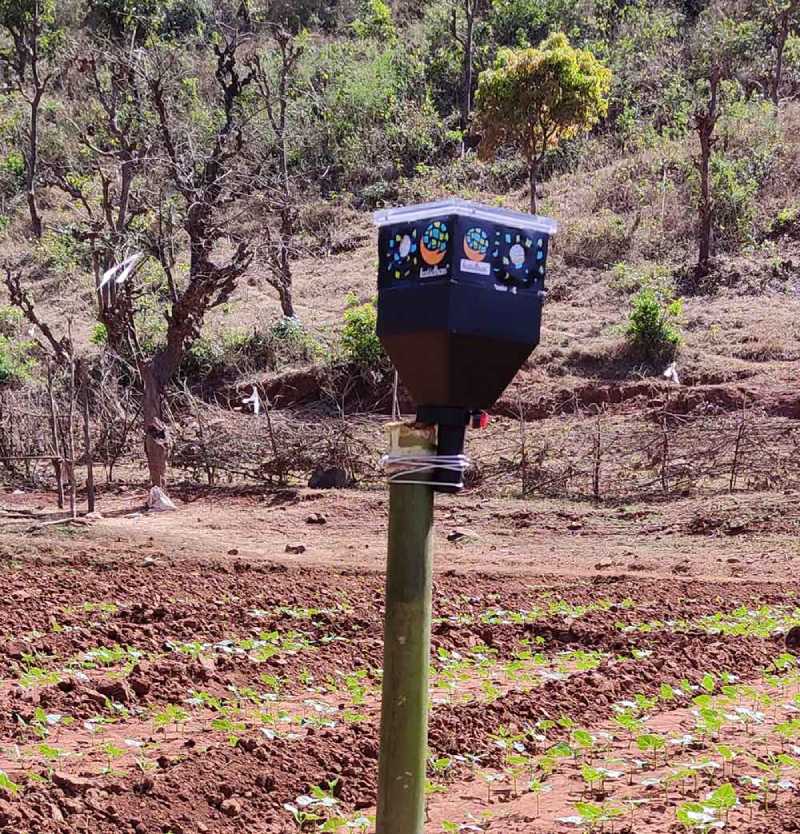Katidhan Tech Private Limited, an agritech startup based in Bengaluru, is transforming the way India addresses human-wildlife conflict. With a mission to safeguard both rural livelihoods and biodiversity, the company deploys sustainable, tech-driven deterrent systems that protect crops without harming wildlife.
Driven by a foundation of research, empathy, and environmental consciousness, Katidhan integrates resilient hardware with contextual intelligence, engineered specifically to withstand the unique challenges of rural India. Its flagship product, Parabraksh, exemplifies this innovation—a solar-powered, AI-enabled deterrent light that uses adaptive illumination patterns to ward off wild animals, including elephants and leopards. The impact is tangible: fewer wildlife incursions, stronger crop yields, and a measurable boost in farmer incomes.
Building on this success, Katidhan is piloting Kapikaat, a precision bio-acoustic device that repels monkeys using targeted sound waves. Early trials, especially in the cardamom fields of Sikkim, indicate significant promise and scalability. So far, the company has protected more than 1,100 agricultural sites across India, reducing crop loss and fostering a harmonious coexistence between communities and wildlife.
At Startup Mahakumbh, in an exclusive interview with The Interview World, Shreetuja Kuanar, Marketing Associate at Katidhan, offered an in-depth look into the company’s groundbreaking solutions. She shared insights on how a single device effectively covers large farmland areas, detailed the number of farmers who have directly benefited, and discussed the product’s pricing model and return on investment.
Here are the key takeaways from her conversation.
Q: Can you walk us through some of the innovative solutions Katidhan has developed to safeguard crops from wildlife threats, and how these are transforming traditional farm protection methods?
A: Katidhan develops agritech solutions specifically designed for farmers to combat the growing challenge of wild animal incursions. In many farmlands, wildlife such as wild boars, nilgai, elephants, and monkeys frequently damage crops, threatening rural livelihoods.
To address this, Katidhan has engineered a non-invasive deterrent system that protects farmland without causing harm to animals. At the heart of this innovation is a solar-powered light that blinks throughout the night. Strategically mounted above the average height of the targeted animal, the device creates an illusion of a larger presence—mimicking either a predator or a human. This visual cue instinctively deters animals, preventing them from entering the fields.
Unlike traditional solutions such as electric fences or jhatka machines—which can injure or kill wildlife—Katidhan’s approach prioritizes coexistence. The technology works on animal behavior, not brute force. It combines empathy with effectiveness, deterring intrusions while upholding the principle of animal harmony.
Powered by a solar panel, the system charges during the day and operates automatically at night through integrated sensors. This ensures energy efficiency, minimal maintenance, and consistent protection for the farmers—day after day, season after season.
Q: What is the effective coverage area of this device, and is it designed to deter wildlife during both day and night?
A: This equipment can cover up to 1.5 acres with a single unit. It is designed exclusively for animals, offering no effect on birds or insects. Additionally, it operates solely during the night.
Q: How many farmers have adopted this product so far?
A: To date, we have assisted approximately 800-900 farmers. In addition, we collaborate with NGOs dedicated to supporting farmers. We are also engaging with the government to further our efforts. Moreover, our work has been highlighted on Shark Tank, Season 3.
Q: What is the price point of this product?
A: The cost of one unit is Rs. 10,500, plus an additional 12% GST. This is a solar-powered vehicle, designed for outdoor use and built to withstand various weather conditions, ensuring durability.
Q: What kind of return on investment can farmers expect from this product, and how soon do they typically see measurable benefits?
A: The return on investment for our product is substantial. Typically, farmers incur losses of Rs. 50,000 to Rs. 60,000. By installing this product, which costs approximately Rs. 11,000, including GST, they can avoid these losses. In fact, the product will help them recover and prevent the financial setback they would have otherwise faced.









